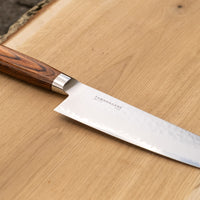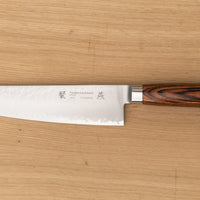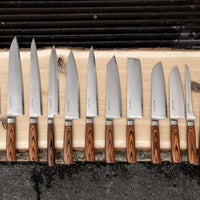





Tamahagane "TSUBAME" Kengata 190mm (7.5")
|
✔︎ No import fees & duties - worldwide |
- Description
- Specifications
- Knife Care
- Shipping
The Kengata blade shape is similar to a chef’s knife, but has a more striking look. Kengata translates as “sword like” and it is the classic Bunka shape with the reverse tanto tip (also known as K-tip). It is a fantastic choice when buying your first knife, as it will give you a gentle nudge – admittedly past the point of no return – into the world of insanely sharp Japanese knives.
BLADE SHAPE:
The use of Kengata blade is versatile and it can handle a wide variety of kitchen tasks. The profile and length of the blade are suitable for both long and short cuts, the gentle curve of the belly is perfect for chopping on a kitchen board, and the sharp tip excels at tasks where precision is key.
The kengata (meaning “sword-like”) shape is similar to the bunka, whose fundamental attributes are instantly recognizable: reverse tanto tip for precision work, wider profile and a slightly shorter blade length. It departs from the usual form, though, with a blade that isn’t as flat, but instead curves slightly towards the tip. This way, the knife can be rocked back and forth on the cutting board, allowing for a different cutting technique that some might miss with a traditional bunka. It is still great for chopping, though, as it is for preparing all kinds of meat and raw fish.
Kengata and Bunka share the shape of the tip, but differ in blade width – the former is somewhat narrower, thus the purpose of its use is similar to Gyuto knives.
STEEL:
This series from Tamahagane is made from VG-5 stainless steel. It is another high-grade steel from Takefu Steel Ltd., designed with high-quality cutting tools in mind. After hardening, it reaches a hardness of about 60 HRC, which guarantees good sharpness. VG-5 is characterized by high resistance to corrosion, as well as wear and cracking, making it a great choice for pro chefs working in a commercial kitchen. VG-5 steel belongs to the V-Gold group of steel, which means that it is extremely hard and corrosion-resistant and gives the blade a sharpness that is second to none. It is durable, as well as easy to sharpen and care for.
VG-5 composition: Carbon: 0,7-0,8 %, Chromium: 13-15 %, Molybdenum: 0,2-0,4 %, Vanadium: 0,1-0,2 %, Nickel: <0,25%, Copper: <0,25%
GEOMETRY:
The beveled edge is sharpened by hand at a 14-15˚ angle and features an incredible mirror polish finish with perfect balance between sharpness and strength, thus the blade is also suitable for work in a professional environment.
LAMINATION:
The core is enveloped by two outer layers of SUS410 stainless steel hardened to between 28-32 HRC that enhance flexibility and protect the core from external elements.
At the start, the three layers are 20mm thick and are compressed to just 2mm during the forging process. This makes the knives from the Tamahagane line unbelievably thin and consequently very sharp. They retain edge for a very long time and are simple to resharpen after becoming dull.
BLADE FINISH:
The outer layers have a matte finish and feature subtle hammer imprints that give the knife its distinctive look. The fine line between the jigane (softer steel) and hagane (hard steel) layers resembles a barely noticeable growth ring that divides the knife in two parts and adds to the elegant look of the knife.
HANDLE:
The handle is made out of pakka wood laminate in light brown color. It is quite large in comparison to handles on other Japanese knives and thus enables a firm grip. It is suitable for both right- and left-handed users. We especially recommend this type of handle to chefs with larger hands who usually struggle to find a suitable and comfortable Japanese knife.
BLACKSMITH:
Tamahagane knives are made in the Tsubame-Sanjo region of Niigata prefecture in the North of Japan. The region is known for steel products that are made using traditional skills and knowledge blended with modern methods and technology. The smithy uses the name Tamahagane for this exceptional line of knives which boasts long-lasting sharpness and is an intricate blend of tradition, centuries worth of experience and the advancement of modern metallurgy.
Tamahagane knives can be compared to high-end sport cars that are designed to strike that perfect balance between the front and back end with an even distribution of weight – in this case, between the blade and the handle. This 50:50 ratio was always at the forefront of the creative process. This is evident as soon as we hold the knife in our hands. The weight of the handle is perfectly balanced by the weight of the blade. This well-balanced weight of the knife together with the superior sharpness make for tireless work even after long hours behind a professional kitchen counter.
Tamahagane knives are therefore extremely durable, retain an edge for a very long time, and are easy to sharpen. They also combine timeless, simple design with ultimate sharpness. They have an elegant look without sacrificing high quality and efficiency. They are perfect for home-cooking enthusiasts and professional chefs who look for perfect balance and durability in their faithful kitchen assistant.
Blade shape: Kengata (Bunka)
Steel type: VG-5
Blade construction: San-mai / V-edge / tsuchime (matte)
Hardness (HRC scale): 61
Overall length: 320mm (12.6")
Blade length: 190mm (7.5")
Blade height: 46mm (1.8")
Spine thickness: 2mm (0.1")
Weight: 190g (6.7 oz)
Handle length: 124mm (4.9")
Handle type / wood: Western / Pakka
Kanji on the blade:
Blacksmith: Tamahagane
Location of the smithy: TSUBAME-SANJO / Niigata Prefecture / Japan
☝️ Japanese kitchen knives in our store are handmade from natural materials. Slight variations in color, texture, weight and other dimensions are possible. We try to give a good photographic representation of our products, however computer screen resolution and colors do vary, so products might not look exactly as they are seen on screen.

Blade wear depends on the quality of steel, usage and maintenance of the blade. Japanese knives are made of high-quality steels. Follow these tips to keep your Japanese knife in top-notch shape:
✔ Use a wooden, plastic or rubber cutting board.
✔ After use, wash the knives and wipe them dry.
✔ For storage, use a knife holder or a protective knife sheath (saya).
✔ A good cutting technique is your best bet to prolong sharpness.
✔ Use sharpening stones to sharpen the knife.
❗️Don’t leave the knife in the sink. Wash it by hand.
❗️Don’t wash the knife in the dishwasher.
❗️Don’t use the knife on glass, ceramics, marble or steel surfaces.
❗️Don’t scrape the food off the cutting board with the edge of the blade. Use the spine of the knife instead.
❗️Knife is a tool intended for specific use - cutting food. It is not a can opener, screwdriver, trowel, wire cutter, hammer etc.
→ For more details, read our guide
on Maintenance of Kitchen Knives.
🤙 Contact us if you need some help. We reply within 1 business day.
SHIPPING RATES:
- €10 - flat worldwide rate with DHL Express (express delivery, 2-5 business days).
- FREE - all orders over €300 (DHL Express).
EXCEPTIONS:
See our Shipping page for more details.
DUTIES AND IMPORT TAXES:
We ship all orders DDP (duties & taxes paid). This means you will not be charged for any import fees and taxes (including VAT). All our prices are final. The price you see at checkout is the final price, no hidden costs.
DELIVERY TIME:
- Europe: 1-2 business days
- US & Canada: 2-4 business days
- Rest of the World: 3-5 business days
RETURNS:
Our return policy lasts 30 days. If more than 30 days have gone by since the day you received your order, unfortunately we can’t offer you a refund or exchange.
→ Read our SHIPPING & RETURNS policy for more info. We strive to solve any issues fast and with as little hassle for you. If you have some additional questions, please contact us.
Does ‘tamahagane’ sound familiar?
Well, if you are only slightly interested in the ancient Japanese craft of forging blades, then you probably already heard about tamahagane steel.
Tamahagane is considered the mother of all steels when we talk about katanas.
The word tamahagane can be broken down into two parts. Tama means "round and precious", like a gem, while the word hagane means "steel". Tamahagane can therefore be directly translated into precious steel - it is raw steel of the best quality used to make true katanas, those that are the hardest, most flexible, light and exceptionally sharp.
While Tamahagane smithy does not make knives from tamahagane steel, they certainly carry the knowledge and history of this precious metal.
Each knife comes with:
✔️ Instructions and knife care leaflet.
✔️ A preventive Band-Aid – the knives are very sharp! 😉
✔️ Original box from the blacksmith, which we wrap in an old Japanese newspaper sheet – so every knife is ready to be passed on as a gift as soon as it hits your doorstep!
✔️ We also offer a special gift wrapping option with the traditional Japanese washi paper.
QUIZ
Still doubting which type of Japanese knife should best fit your needs?
We created a 5-steps quiz to help you find the perfect knife based on your cooking skills and the type of food you prepare.






